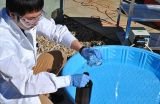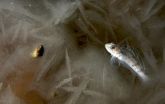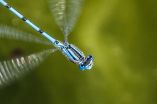(Press-News.org) Edmonton—Cleaning up oil sands tailings has just gotten a lot greener thanks to a novel technique developed by University of Alberta civil engineering professors that uses solar energy to accelerate tailings pond reclamation efforts by industry.
Instead of using UV lamps as a light source to treat oil sands process affected water (OSPW) retained in tailings ponds, professors Mohamed Gamal El-Din and James Bolton have found that using the sunlight as a renewable energy source treats the wastewater just as efficiently but at a much lower cost.
"We know it works, so now the challenge is to transfer it into the field," says Gamal El-Din, who also worked on the project with graduate students Zengquan Shu, Chao Li, post doctorate fellow Arvinder Singh and biological sciences professor Miodrag Belosevic.
"This alternative process not only addresses the need for managing these tailings ponds, but it may further be applied to treat municipal wastewater as well. Being a solar-driven process, the cost would be minimal compared to what's being used in the field now."
The team's research findings are published in the Environmental Science and Technology.
Oilsands tailings ponds contain a mixture of suspended solids, salts, and other dissolvable compounds like benzene, acids, and hydrocarbons. Typically, these tailings ponds take 20 plus years before they can be reclaimed.
The solar UV/chlorine treatment process when applied to the tailings ponds would make OSPW decontamination and detoxification immediate.
The sun's energy will partially remove these organic contaminants due to the direct sunlight. But, when the sunlight reacts with the chlorine (or bleach) added to the wastewater, it produces hydroxyl radicals (powerful oxidative reagents) that remove the remaining toxins more efficiently. The chlorine leaves no residuals as the sunlight causes it to decompose.
In laboratory-scale tests the solar UV/chlorine treatment process was found to remove 75 to 84 per cent of these toxins.
"With this solar process, right now, the wastewater on the top of the tailings ponds is being treated. But because we have nothing in place at the moment to circulate the water, the process isn't being applied to the rest of the pond," says Gamal El-Din.
"Because we are limited by the sunlight's penetration of the water, we now must come up with an innovative design for a mixing system like rafts floating on the ponds that would circulate the water. Installing this would still be much more cost effective for companies. It is expected that the UV/chlorine process will treat the OSPW to the point that the effluent can be fed to a municipal wastewater treatment plant, which will then complete the purification process sufficiently so the water can be discharged safely into rivers.
"This process has been gaining a lot of attention from the oil sands industry. We're now seeking funds for a pilot-pant demonstration and are looking at commercializing the technology."
INFORMATION:
This research was funded by Trojan Technologies, a Collaborative Research and Development grant from the Natural Sciences and Engineering Research Council of Canada, Alberta Innovates-Energy Solutions and Alberta Innovates-Environment Solutions, and the Helmholtz-Alberta Initiative.
Solar energy-driven process could revolutionize oil sands tailings reclamation
New process could be applied to industrial or municipal wastewater
2014-09-23
ELSE PRESS RELEASES FROM THIS DATE:
Antifreeze proteins in Antarctic fish prevent both freezing and melting
2014-09-23
Antarctic fish that manufacture their own "antifreeze" proteins to survive in the icy Southern Ocean also suffer an unfortunate side effect, researchers funded by the National Science Foundation (NSF) report: The protein-bound ice crystals that accumulate inside their bodies resist melting even when temperatures warm.
"We discovered what appears to be an undesirable consequence of the evolution of antifreeze proteins in Antarctic notothenioid fish," said University of Oregon doctoral student Paul Cziko, who led the research with University of Illinois animal biology ...
NYU-Mount Sinai Beth Israel study explores drug users' opinions on genetic testing
2014-09-23
Genomic medicine is rapidly developing, bringing with its advances promises of individualized genetic information to tailor and optimize prevention and treatment interventions. Genetic tests are already guiding treatments of the human immunodeficiency virus (HIV) and hepatitis c virus (HPC), and emerging research is showing genetic variants may be used to screen for an individual's susceptibility to addiction to a substance, and even inform treatments for addiction.
While there appear to be many benefits inherent in the development of this field and related research, ...
Slight alterations in microRNA sequences hold more information than previously thought
2014-09-23
(PHILADELPHIA) – Researchers have encountered variants or isoforms in microRNAs (miRNAs) before, but assumed that these variants were accidental byproducts. A recent study, published in the journal Oncotarget this month, shows that certain so called isomiRs have abundances that depend on geographic subpopulations and gender and that the most prevalent variant of a given miRNA may not be the one typically listed in the public databases.
"This study shows that microRNA isoforms are much more common than we had previously assumed. The fact that some isoforms are shared by ...
Mefloquine fails to replace SP for malaria prevention during pregnancy
2014-09-23
In this issue of PLOS Medicine, Clara Menendez from the Barcelona Institute for Global Health (ISGlobal), Spain, and colleagues report results from two large randomized controlled trials conducted in Africa to test an alternative drug for malaria prevention in HIV-negative and HIV-positive pregnant women.
Pregnant women and their unborn children are at a high risk for complications from malaria infection, and finding new treatment options is important because the malaria parasites are becoming increasingly resistant to the existing WHO-recommended drug sulphadoxine-pyrimethamine ...
Patients accept false-positives to achieve diagnostic sensitivity
2014-09-23
OAK BROOK, Ill. (September 23, 2014) – Both patients and healthcare professionals believe diagnosis of extracolonic malignancy with screening computed tomography (CT) colonography greatly outweighs the potential disadvantages of subsequent radiologic or invasive follow-up tests precipitated by false-positive diagnoses, according to a new study published in the October issue of the journal Radiology.
Diagnostic tests used for cancer screening programs usually target a specific organ. However, when screening for colorectal cancer with CT colonography, abdominal and pelvic ...
Medical students who attended community college likelier to serve poor communities
2014-09-23
IMPACT
The community college system represents a potential source of student diversity for medical schools and physicians who will serve poor communities; however, there are significant challenges to enhancing the pipeline from community colleges to four-year universities to medical schools. The authors recommend that medical school and four-year university recruitment, outreach and admissions practices be more inclusive of community college students.
FINDINGS
Researchers from UCLA, UC San Francisco and San Jose City College found that, among students who apply to and ...
Study helps assess impact of temperature on belowground soil decomposition
2014-09-23
Hilo, Hawai`i–The Earth's soils store four times more carbon than the atmosphere and small changes in soil carbon storage can have a big effect on atmospheric greenhouse gas concentrations. A new paper in the journal Nature Climate Change concludes that climate warming does not accelerate soil organic carbon decomposition or affect soil carbon storage, despite increases in ecosystem productivity.
The research, led by U.S. Forest Service Research Ecologist Dr. Christian Giardina, with the agency's Institute of Pacific Islands Forestry, Pacific Southwest Research Station, ...
Facial masculinity not always a telling factor in mate selection
2014-09-23
EUGENE, Ore. -- Women living where rates of infectious disease are high, according to theory, prefer men with faces that shout testosterone when choosing a mate. However, an international study says not so much, says University of Oregon anthropologist Lawrence S. Sugiyama.
The new study, on which Sugiyama is one of 22 co-authors, ended with that theory crumbling amid patterns too subtle to detect when tested with 962 adults drawn from 12 populations living in various economic systems in 10 nations.
The study -- coordinated by Ian S. Penton-Voak of the School of Experimental ...
The mechanics of tissue growth
2014-09-23
PITTSBURGH – When the body forms new tissues during the healing process, cells must be able to communicate with each other. For years, scientists believed this communication happened primarily through chemical signaling. Now researchers at Carnegie Mellon University and the University of Pittsburgh have found that another dimension – mechanical communication – is equally if not more crucial. The findings, published in this week's issue of the Proceedings of the National Academy of Sciences, could lead to advancements in treatments for birth defects and therapies for cancer ...
Insects' fear limits boost from climate change, Dartmouth study shows
2014-09-23
Scientists often measure the effects of temperature on insects to predict how climate change will affect their distribution and abundance, but a Dartmouth study shows for the first time that insects' fear of their predators, in addition to temperature, ultimately limits how fast they grow.
"In other words, it's less about temperature and more about the overall environmental conditions that shape the growth, survival and distribution of insects." says the study's lead author Lauren Culler, an Arctic postdoctoral researcher at Dartmouth.
The study appears in the journal ...
LAST 30 PRESS RELEASES:
AI accurately spots medical disorder from privacy-conscious hand images
Transient Pauli blocking for broadband ultrafast optical switching
Political polarization can spur CO2 emissions, stymie climate action
Researchers develop new strategy for improving inverted perovskite solar cells
Yes! The role of YAP and CTGF as potential therapeutic targets for preventing severe liver disease
Pancreatic cancer may begin hiding from the immune system earlier than we thought
Robotic wing inspired by nature delivers leap in underwater stability
A clinical reveals that aniridia causes a progressive loss of corneal sensitivity
Fossil amber reveals the secret lives of Cretaceous ants
Predicting extreme rainfall through novel spatial modeling
The Lancet: First-ever in-utero stem cell therapy for fetal spina bifida repair is safe, study finds
Nanoplastics can interact with Salmonella to affect food safety, study shows
Eric Moore, M.D., elected to Mayo Clinic Board of Trustees
NYU named “research powerhouse” in new analysis
New polymer materials may offer breakthrough solution for hard-to-remove PFAS in water
Biochar can either curb or boost greenhouse gas emissions depending on soil conditions, new study finds
Nanobiochar emerges as a next generation solution for cleaner water, healthier soils, and resilient ecosystems
Study finds more parents saying ‘No’ to vitamin K, putting babies’ brains at risk
Scientists develop new gut health measure that tracks disease
Rice gene discovery could cut fertiliser use while protecting yields
Jumping ‘DNA parasites’ linked to early stages of tumour formation
Ultra-sensitive CAR T cells provide potential strategy to treat solid tumors
Early Neanderthal-Human interbreeding was strongly sex biased
North American bird declines are widespread and accelerating in agricultural hotspots
Researchers recommend strategies for improved genetic privacy legislation
How birds achieve sweet success
More sensitive cell therapy may be a HIT against solid cancers
Scientists map how aging reshapes cells across the entire mammalian body
Hotspots of accelerated bird decline linked to agricultural activity
How ancient attraction shaped the human genome
[Press-News.org] Solar energy-driven process could revolutionize oil sands tailings reclamationNew process could be applied to industrial or municipal wastewater



